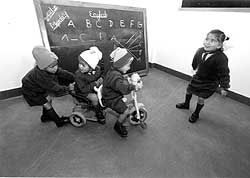 Santa couldn't have been more generous. That's what Anuradha Koirala, founder of Maiti Nepal, must be thinking. Never in her dreams did Nepal's nationally and internationally-known social worker-she's been on Oprah-think she'd be able to house her extended family of over 200 women and children under one roof, and a large one at that. But it's happening.
Santa couldn't have been more generous. That's what Anuradha Koirala, founder of Maiti Nepal, must be thinking. Never in her dreams did Nepal's nationally and internationally-known social worker-she's been on Oprah-think she'd be able to house her extended family of over 200 women and children under one roof, and a large one at that. But it's happening.
Maiti Nepal is preparing to move into its new home, a neat brick complex at Pingalshtan in Gaushala generously built by Dr Winfried Kill, a German philanthropist. Situated on over 4,900 sq m, the new Maiti Nepal Protection and Rehabilitation Centre will be officially opened on 20 January by Queen Komal.
"Having your own home is a dream come true," says an animated Koirala, proudly walking us through the new premises. Workmen and labourers scrub, paint and polish, adding hectic last-minute finishing touches. The petite social worker graciously acknowledges Dr Kill, an economist from the German city Bergisch Gladbach, who was so impressed by Maiti Nepal's work that he decided to donate $1.7 million to build the new complex in memory of his 21-year-old daughter Sonja who died in a cycling accident on 20 January, 1993.
"I guess hard work and dedication do pay off," says Koirala as she bustles through corridors smelling of fresh paint in her trademark crisp cotton saree. A decade ago, Koirala, a former teacher, rented three tiny rooms in Baneswor, where she took in destitute women trying to make ends meet around Pashupatinath. They were women abandoned by their husbands, abused by their in-laws, some still nursing babies, runaway children who found that life in Kathmandu was not so easy, and women working the streets.
The word spread, and the numbers of destitute children and women grew. Today Maiti Nepal is sheltering 138 children and 68 women in a couple of rented houses in Gaushala. It has also expanded as an institution, and runs eight halfway homes around the country for women intercepted being trafficked, one hospice for people with HIV/AIDS in east Nepal and another one planned, and a primary school in Kathmandu aptly named Teresa Boarding.
"The school was opened the day Mother Teresa passed away," says Koirala, speaking of her idol. A pioneer in HIV/AIDS rehabilitation and care in Nepal, Maiti Nepal recently won the $50,000 Reebok Human Rights Award. The new complex houses a legal section, a shelter each for children and women, and a 20-bed clinic operated by a doctor and four nurses trained in HIV/AIDS care. "Since there aren't really any places that take in people with HIV, we expect a lot, especially mother-to-child cases, which are on the rise," says Koirala.
The complex has been designed to ensure that space is used most efficiently, with practical considerations being taken care of. "There are separate blocks for women and children, so the kids don't contract infectious diseases like tuberculosis, which many of the girls suffer from. There's a huge laundry room on the top floor to dry clothes in the monsoon, and also a 50,000 litre water recycling plant. And then there is Koirala's own touch-a small tulsi tree and a little temple. "Religion plays an important role in life," says the social worker.
 Koirala appears to be enjoying setting up house. "We cannot compromise on quality, that's what Dr Kill has insisted," she says, sorting through piles of quilts and bed linen that she's selected herself. "I think the young ones will like greens, yellows and blues, they're cheerful colours." But she's careful about going overboard. "I don't want the children to be overwhelmed by their new surroundings or get accustomed to a lifestyle that is so different from what they're used to in the villages."
Koirala appears to be enjoying setting up house. "We cannot compromise on quality, that's what Dr Kill has insisted," she says, sorting through piles of quilts and bed linen that she's selected herself. "I think the young ones will like greens, yellows and blues, they're cheerful colours." But she's careful about going overboard. "I don't want the children to be overwhelmed by their new surroundings or get accustomed to a lifestyle that is so different from what they're used to in the villages."
When she's not interrogating traffickers or prodding parliamentarians to bring about effective policies to check trafficking, and attending international meets and congresses, she's usually among her extended family-patting a little head here, directing a stern reprimand there, giving a pep talk to her staff, and ticking off donors.
Says Gereon Wagner, a 37-year-old Maiti Nepal supporter, instrumental in contacting Dr Kill with the idea of helping the organisation, "I never expected such a thing to happen. We didn't even have a plan for a separate children's home." Wagner first came to know of Maiti Nepal's work through a documentary on sex slavery in Asia. Initially Wagner, an independent business consultant from the same city as Dr Kill, approached the millionaire for funds to set up a caf? that Maiti Nepal girls would manage. "The idea was to combine the caf? with an information centre on trafficking," says Wagner. But that idea has been put aside for the moment. "I'm too busy trying to help finish the complex in time for the opening," says he.


